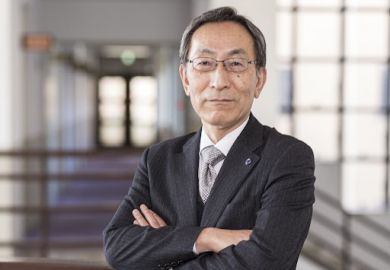A power struggle at the top of Hong Kong’s leading university has been blown into the open by a controversial management team reshuffle.
Xiang Zhang, the vice-chancellor of the University of Hong Kong, was cleared of misconduct in April after a six-month investigation into claims that he had mishandled funds and failed to follow procurement and recruitment procedures. He had denied all wrongdoing.
But Professor Zhang’s leadership has again been called into question following a reshuffle of the university’s executive, led by the council chair, Priscilla Wong, which the vice-chancellor claimed he had not been consulted about.
As the spat escalated, both Professor Zhang and the council publicly accused one other of distorting facts.
On 10 June, the council issued a statement refuting the vice-chancellor’s claims that the new appointments had been made without his knowledge.
It accused Professor Zhang of having failed to fill several vice-president positions since his appointment in 2018, “resulting in a lack of a complete management team and frequent management issues”.
The council also complained of “procedural irregularities and unconventional practices”, including the expansion of Professor Zhang’s staff to 60 and the bypassing of the council on decisions about “major projects”.
Most of these claims were in turn denied in a statement published by Professor Zhang on the university’s website.
The vice-chancellor said the council’s claims were “completely inconsistent with the facts” and maintained that he was “never consulted” over the proposed candidates for the management appointments.
In the reshuffle, Professor Zhang’s key allies were demoted, including Richard Wong, an economics professor who previously held the post of deputy vice-chancellor and provost.
There have been ongoing tensions between Professor Zhang and Ms Wong. When the misconduct investigation began last October, Professor Zhang reportedly criticised a proposal for Ms Wong to set up an office on campus, saying it could undermine academic autonomy.
However, the council has denied any “personal animosity” between the pair, saying it would “continue to approach matters with objectivity and fairness”.
Sources suggested that the council was seeking to limit the president’s influence while simultaneously keeping him in the post, with concerns about his leadership being tempered by a desire to present the tenure of HKU’s first leader born in mainland China as a success.
“There’s no transparency in relation to the vice-chancellor’s management, the investigation and now the appointment of the new management team,” said Patrick Poon, a visiting researcher at the University of Tokyo and an HKU alumnus. “Everything is a mess.”
Ms Wong, the council chair, is married to Martin Liao Cheung-kong, a member of Hong Kong’s legislative council known for his pro-Beijing stance.
In addition, six council members are appointed by the university chancellor and Hong Kong’s chief executive, John Lee.
“The Chinese regime’s usual practice is to exert pressure from above, so I don’t think Beijing and the chief executive can simply claim that they don’t have any role in the matter,” Mr Poon added.
Another source within HKU, who wished to remain anonymous, agreed.
“All of this turmoil must be read against the backdrop of the appointment systems. It is ultimately the government controlling the university by, inter alia, appointing the council chair and, indirectly, all the lay majority members in council,” the source said.
As chancellor, Mr Lee has been forced to intervene. He told the press on 11 June that he had met with both Professor Zhang and Ms Wong and emphasised the “importance of good communication” between the two. “The interests of the university should come first,” he said.





